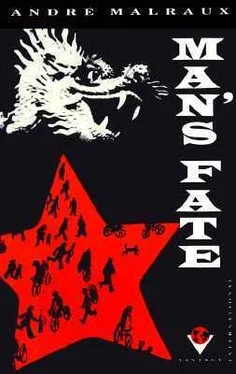Andre Malraux - Man's Fate
Здесь есть возможность читать онлайн «Andre Malraux - Man's Fate» весь текст электронной книги совершенно бесплатно (целиком полную версию без сокращений). В некоторых случаях можно слушать аудио, скачать через торрент в формате fb2 и присутствует краткое содержание. Год выпуска: 1990, Издательство: Vintage, Жанр: Современная проза, на английском языке. Описание произведения, (предисловие) а так же отзывы посетителей доступны на портале библиотеки ЛибКат.
- Название:Man's Fate
- Автор:
- Издательство:Vintage
- Жанр:
- Год:1990
- ISBN:нет данных
- Рейтинг книги:3 / 5. Голосов: 1
-
Избранное:Добавить в избранное
- Отзывы:
-
Ваша оценка:
- 60
- 1
- 2
- 3
- 4
- 5
Man's Fate: краткое содержание, описание и аннотация
Предлагаем к чтению аннотацию, описание, краткое содержание или предисловие (зависит от того, что написал сам автор книги «Man's Fate»). Если вы не нашли необходимую информацию о книге — напишите в комментариях, мы постараемся отыскать её.
As a study of conspiracy and conspirators, of men caught in the desperate clash of ideologies, betrayal, expediency, and free will, Andre Malraux's novel remains unequaled.
Man's Fate — читать онлайн бесплатно полную книгу (весь текст) целиком
Ниже представлен текст книги, разбитый по страницам. Система сохранения места последней прочитанной страницы, позволяет с удобством читать онлайн бесплатно книгу «Man's Fate», без необходимости каждый раз заново искать на чём Вы остановились. Поставьте закладку, и сможете в любой момент перейти на страницу, на которой закончили чтение.
Интервал:
Закладка:
He took her in his arms. She offered her mouth. Through sensuality or through horror of sentimentality he wondered, while he was undressing in the bathroom. The light-bulb was broken, and the toilet articles looked reddish, lighted by the conflagrations. He looked out through the window: in the avenue, a crowd in motion, like millions of fish under the quivering surface of a black sea; it seemed to him suddenly that the soul of this mob had left it, like the mind of a sleeper in a dream, and that it was burning with a joyous energy in those harsh flames that lighted up the outlines of the buildings.
When he came back she was dreaming and no longer smiled. Although he was used to this change of expression it gave him once again the sensation of emerging from a spell of madness. Did he want merely to be loved by the smiling woman from whom this unsmiling woman separated him like a stranger? The armored train was firing at minute intervals, as for a tri^ph: it was still in the hands of the gove^rnmental forces, as were the barracks, the arsenal and the Russian church.
“Have you seen M. de Clappique again, dear?” she asked.
The whole French colony of Shanghai knew Clappique. Valerie had met him at a dinner two days before; his whimsicality delighted her.
“Yes. I commissioned him to buy me some of Kama’s wash-drawings.”
“Can you get them at antique-dealers?”
“Not a chance. But Kama is just ret^rcing from Europe; he’ll pass through here in a fortnight. Clappique was tired, he only told two good stories: one about a Chinese burglar who was acquitted because he had wriggled through a lyre-shaped hole into the pawn-shop he was robbing; and this one: Eminent-Virtue had been raising rabbits for twenty years. His house stood on one side of the internal revenues office, his hutches on the other. On one occasion the customs-inspectors forgot to tell the other shift about his daily trip. He arrives, his basket full of grass under his ^m. ‘Hey, there! Show your basket.’ Under the grass there were watches, chains, flashlights, cameras. ‘Is that what you feed your rabbits?’ ‘Yes, Sir. And (assuming a menacing attitude toward the rabbits) and if they don’t like it, they won’t get anything else to eat today. ’ ”
“Oh!” she said, “it’s a scientific story; now I understand. The bell-rabbits, the drum-rabbits, you know, all those charming little creatures who fare so well in the moon and places like that, and so badly in children’s rooms, that’s where they come from. The sad story of Eminent-Virtue is another heart-rending injustice. And the revolutionary papers are going to make a great protest, I imagine: for you may be sure that the rabbits ate those things.”
“Have you read Alice in Wonderland, darling?”
He despised women-though he could not do without them-sufficiently to call them darling.
“What a question! I know it by heart.”
“Your smile makes me think of the ghost of the cat which never materialized. All one could see was a ravishing cat-smile floating in the air. Oh! why does a woman’s intelligence always insist on choosing some other field than its own?”
“Which is its own, dear?”
“Charm and understanding, obviously.”
She reflected:
“What men mean by that is a submissive mind. You recognize in a woman only the kind of intelligence which gives you its approval. It's so-so restful. ” “To give herself, for a woman, to possess, for a man, are the only two means that human beings have of understanding anything whatsoever. ”
“Hasn’t it occurred to you, dear, that women never give themselves (or hardly ever) and that men possess nothing? It’s a game: ‘I think I possess her, therefore she thinks she is possessed. ’ Yes? Really? Listen, I’m going to say something very wicked-but don’t you think it’s the story al over again of the cork which considered itself so much more important than the bottle?”
Moral license in a woman excited Ferral, but intellectual license only irritated him. He felt an urgent need to arouse the only feeling which gave him a certain power over a woman: Christian shame, together with gratitude for the shame endured. If she did not guess this, she guessed that he was slipping away from her, and as she was responsive, after all, to the physical desire which she could see growing, amused at the idea that she could catch him and bring him back at will, she looked at him with her mouth half-open (since he liked her smile.), expressing with her eyes the offer of herself, assured that he, like almost all men, would take her desire to seduce him for a surrender.
He joined her in bed. Caresses gave Valerie a sealed expression which he was eager to see transformed. He summoned her other expression with too much passion not to hope that the pleasure of the senses would imprint it upon Valerie’s face. He believed that he was thus destroying a mask, and that what was deepest, most secret in her was necessarily what he preferred. He had never had intercourse with her except in the dark. But hardly had he gently drawn her legs apart with his hand, than she turned out the light. He turned it on again.
He had fumbled for the switch, and she thought the light had gone on by accident; she turned it off again. He immediately turned it on once more. Highly strung, she felt herself on the verge both of laughter and anger; but she met his look. He had pushed the switch out of reach, and she realized that he expected his chief pleasure from the sensual transformation of her features. She knew that she was really dominated by her sexual feelings only at the beginning of an affair, or when she was taken by surprise: when she felt she could not find the switch, a familiar warmth seized her, mounted along her body to the tips of her breasts, to her lips, which she guessed by Ferral’s look were imperceptibly swelling. She gave herself up to this warmth and, pressing him against her with her thighs and her arms, plunged with long pulsations far from a shore upon which she knew she would presently be thrown back, but bringing with her the resolve not to forgive him.
Valerie was sleeping. Her regular breathing and the relaxation of sleep gently swelled her lips, and the wanton expression which pleasure gave to her features lingered like an afterglow. “A human being,” thought Fer- ra! “an individual life, unique, isolated, like mine. ” He imagined himself as her, inhabiting her body, feeling in her place that enjoyment which he could experience only as a humiliation; he imagined himself-himself- humiliated by this passive voluptuousness, by this woman’s sex. “It’s idiotic: she feels herself in terms of her sex as I do in terms of mine, neither more nor less. She feels herself as a knot of desires, sadness, pride, as a destiny. Obviously.” But not at this moment: sleep and her lips gave her over to a perfect sensuality, as though she had agreed to be no longer a free and living being, but only the expression of gratitude for a physical conquest. The great silence of the Chinese night, with its smell of camphor and leaves, it too asleep far out into the Pacific, covered her over, beyond the realm of time: not a ship called; not a gun fired. She did not trail with her in her sleep memories and hopes which he would never possess: she was nothing but the other pole of his own pleasure. Never had she lived: never had she been a little girl.
The cannon, once more: the ^armored train was again beginning to fire.
The next day, four o’clock in the afternoon
From a clock-maker’s shop which had been transformed into a post, Kyo observed the ^armored train.
Two hundred yards ahead of it and behind it the revolutionaries had blown up the rails, torn up the level crossing. Of the train which barred the street, motionless, dead, Kyo could see only two carriages, the one closed like a cattle-wagon, the other seemingly flattened out beneath its turret, from which a small-caliber gun projected. No men: neither the besieged hidden behind their blocked loop-holes nor the assailants, distributed in the houses overlooking the tracks. Behind Kyo, in the direction of the Russian church and the Commercial Printing House, the volleys did not let up. The soldiers who were ready to give up their arms were out of the fight; the rest would die. All the insurgent sections were now armed; the governmental troops, their front smashed, were fleeing in the rain-drenched wind towards Nanking by the sabotaged trains and the roads pitted with mud-holes. The army of the Kuomintang would reach Shanghai in a few hours: couriers were arriving every moment.
Читать дальшеИнтервал:
Закладка:
Похожие книги на «Man's Fate»
Представляем Вашему вниманию похожие книги на «Man's Fate» списком для выбора. Мы отобрали схожую по названию и смыслу литературу в надежде предоставить читателям больше вариантов отыскать новые, интересные, ещё непрочитанные произведения.
Обсуждение, отзывы о книге «Man's Fate» и просто собственные мнения читателей. Оставьте ваши комментарии, напишите, что Вы думаете о произведении, его смысле или главных героях. Укажите что конкретно понравилось, а что нет, и почему Вы так считаете.











